
The Lessons in Real Estate Show
By Anthony Pinto
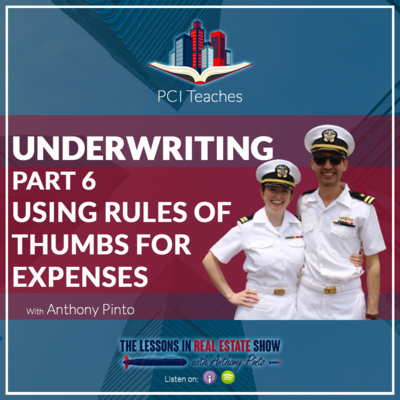
The Lessons in Real Estate ShowJan 18, 2021

Episode 100: Celebrating our 100th Episode with Anthony and Peggy Pinto
In this episode, we explore:
- Celebrating 100 episodes of Lessons In Real Estate Show
- Going on hiatus
- Thanking you, the learners
- What's next?
About Anthony:
Anthony Pinto is the Managing Partner of Pinto Capital Investments (PCI), a real estate investment firm focused on acquiring affordable and workforce multifamily properties and apartment buildings through syndications. Since 2019, We have gone full cycle on 2 large apartment complexes (+100 units) with IRR in excess of 85%.
Today's episode is a celebration of Lessons in Real Estate Show's 100th episode. Two and a half years on the air and we still clearly remember the hours, the guests, recordings, and editing that led to today. We're also taking this opportunity to express our thank you to the learners and listeners. We also talk about what's next for the podcast and maybe some future plans. Check out this episode to learn more!
Connecting with the Guest:
Website: https://pintocapitalinvestments.com/
Facebook: https://www.facebook.com/pintocapitalinvestments/
Linkedin: https://www.linkedin.com/in/anthony-pinto/
#100thepisode
#realestate
#gratitude

Episode 99: A Walk Down Memory Lane with Peggy Pinto
In this episode, we explore:
- Guest Intro: Peggy Pinto
- Reasons why we do real estate
- Start in real estate
- Getting over fears and doubts
- Sacrificing time with family to have more time with family
- In the Military, you're replaceable
About Peggy:
Peggy Pinto is an Active Duty Navy Nurse, Co-Owner of Pinto Capital Investments, Wife to Anthony, a Villanova Graduate, a creative content creator, and recently a Mother to our Baby girl, Mary. Today she joins us in our 99th episode.
She shares with us her journey with Anthony through life, real estate, and the military. Join us as she shares details about being a dual military spouse and investing in real estate. She also talks about real estate from her perspective, overcoming her own doubts and fears.
Snapshot:
- What is your number one failure in real estate?
- Learning the hard lesson to trust your gut, whether that is the people or properties.
- What advice do you have for other military investors to be successful?
- Set aside time for each other. Remember your why.
- What inspired you to marry a military and serve your country?
- My Mom was a Navy Reservist deployed to Afghanistan.
- What is your dream?
- Working to live. Figuring out that balance for us. Being able to live comfortably.
#multifamilyrealestate
#realestateandmilitary
#dualmilitaryspouse

Episode 98: Fighting Human Trafficking with the Power of Real Estate
Welcome back to another episode. Today’s guest, Tyler Goble, is an active duty Marine Corps officer who uses proprietary code to analyze investment opportunities and mitigate risk. He is also the owner of LTG investments, a company dedicated to fighting human trafficking through the power of real estate.
If you would like to know more about real estate investing. Check our website pintocapitalinvestments.com.
In this episode, we explore:
- Guest intro and background: Tyler Goble
- Military background and how he got into real estate
- Using real estate to fight human trafficking
- Evaluating first property and house hacking
- Exit strategy on the first property
- Analyzing markets and understanding taxes
- Using data to analyze markets
About Tyler:
Tyler is a graduate of the United States Naval Academy with a bachelor of science in Quantitative Economics and played inside linebacker for the Midshipmen. Following graduation, he was commissioned into the United States Marine Corps where he served as an infantry officer. Tyler is currently obtaining his master's degree in Operations Research with a certificate in Operational Data Science and Statistical Machine Learning.
He is passionate about fighting human trafficking through real estate investing. Along with his wife Lyndsey, they founded LTG Investments, a real estate investment company that is dedicated to leveraging their own time, talents, and treasure to help end modern day slavery. Tyler handles all investment decisions for the firm, utilizing a deep understanding of statistics and proprietary algorithms to mitigate risk and maximize returns.
The method is real estate investing, the goal is 1M in donations a year from active real estate investing and 100k in passive income donated annually.
Snapshot: 41:29
1. What is your number one failure in real estate?
- Over rehabbing a five-bedroom place.
2. What advice do you have for other military investors to be successful?
- Don’t suck at your job because it does carry over.
3. What inspired you to serve your country?
- Wanting to be part of a team. Serve other folks that are passionate and motivated.
4. What is your dream?
- Figure out a way to build something so big that we could be more generous.
Connecting with the Guest:
Website: http://ltginvestments.com/
LinkedIn Profile: https://www.linkedin.com/in/tylergoble54/
https://www.linkedin.com/company/ltg-investments-llc/
Instagram: https://www.instagram.com/ltg_investments/?hl=en
Facebook: https://www.facebook.com/LTGInvestments
Email: tyler@ltginvestments.com
#HumanTrafficking
#RealEstate
#thelessonsinrealestate

Episode 97: Space Force and Multifamily Investing with Myles Spetsios
For today's episode, we have an awesome guest Myles Spetsios. A founding member of The Joint Chiefs of Real Estate also known as JCORE. He is an active duty space force officer and a general partner on over 250 units. Tune in as he shares what he has done to make investing in real estate work even while on active duty.
If you would like to know more about real estate investing. Check our website https://pintocapitalinvestments.com
Myles Spetsios is a seasoned Space Force Officer with experience leading large teams at the tactical and operational levels. He has a degree in engineering and experience in project management and business administration. Myles helps others invest passively in cash-flowing assets.
While in the Air Force, Myles has led over 200+ Airmen in various capacities and has been responsible for over $100M worth of equipment. His experience leading teams in the areas of Civil Engineering, and IT directly correlate to the Multifamily industry. Myles also excels at the technical aspects of real estate drawing on his background in Electrical and Computer Engineering. His primary skills are in Project Management; Data Analysis; Business Plan Development; and Underwriting. He is currently part of the JCORE team serving as the lead underwriter.
In this episode, we explore:
- Guest Background
- Getting into the Real Estate Investment
- Having the right partners
- Different skill sets for each roles
- Trusting people in finding deals
- Importance of communication
- Finding a great property management team
Snapshot:
1. What is your number one failure in real estate?
- Not going after more. Having limited belief and limited mindset
2. What advice do you have for other military investors to be successful?
- You can do it too. Take the time. Get educated.
3. What inspired you to serve your country?
- Very strong family ties.
4. What is your dream?
- Build a legacy for my family.
Connecting with the Guest:
Website: https://jcoreinvestments.com/
LinkedIn Profile: https://www.linkedin.com/in/spetsios/
Instagram: https://www.instagram.com/jcore_investments/
Facebook: https://www.facebook.com/jcoreinvestments/
#multifamilyrealestate
#spaceforce
#thelessonsinrealestate

Episode 96: $1M in Real Estate in 1 Year with Patrick Menefee
Very excited to have Patrick Menefee on the show. He is the founder and CEO of Invest DGP. He created the Invest DGP platform to give back to the community and help others the way he’s been helped!
Patrick grew up in Minnesota. He graduated from Ranger School in 2012 and spent time in Africa and Southwest Asia over his 6-year career as an Infantry Officer before joining corporate America. He started with small multifamily properties and quickly scaled from 8 properties and 20 units within 10 months of getting started. He was able to do this while working full time in the banking industry as a consultant with one of the Big Four, spending every week traveling and living out of a hotel. In August 2020 He shifted his primary focus to house flipping, and on October 30, 2020, decided to quit his well-paying full-time job to go into real estate full time. He currently runs and is scaling a house flipping business in the Charlotte, NC MSA.
You can do real estate as an investor or as a full-time business. Patrick loves real estate and the business side of it so today, He shares the key lessons he learned about the business side of real estate, taking massive action, how he transitioned from real estate as a side hustle to a full-time business, learning from past mistakes, and how to go about finding the right people once you’ve made this decision. Tune in!
If you would like to know more about real estate investing. Check our website pintocapitalinvestments.com.
In this episode, we explore:
-Guest Background
-Military background and how he got into real estate
-What made him take action
-Own money or raise capital?
-First two properties
-Calling up a contractor
-One of the main reasons people get into real estate on the side
-Getting into hiring
-Transition from real estate investor to a real estate business owner
-Options as a CEO
-One that looks out and away while the other one looks down and in
-How to go about finding the right person
-Partnerships
Patrick was born and raised in Minnetonka, MN. After earning a business degree from Iowa State University he was commissioned as an Infantry Officer in the US Army. He graduated from Ranger School in 2012 and spent time in Africa and Southwest Asia over his 6-year career before joining corporate America as a consultant at a Big Four firm.
Snapshot: 40:26
1. What is your number one failure in real estate?
-Being too trusting. The worst deals were tied back to that.
2. What advice do you have for other military investors to be successful?
-Systems. There are a ton of systems that are in place and you can learn from those.
-Setting and enforcing standards. You need to have standards for everything you do in your business.
3. What inspired you to serve your country?
-Sense of duty and honor
-A neighbor who enlisted ahead of me. I saw him go do it and that was a very big inspiration for me.
4. What is your dream?
-Build a legacy, a life. Leaving an impact on my family and for God.
Connecting with the Guest:
Website: https://www.investdgp.com/
LinkedIn Profile: https://www.linkedin.com/in/patrick-menefee
Instagram: https://www.instagram.com/investdgp/?hl=en
Facebook: https://www.facebook.com/patrick.menefee.3
Email: patrick@investdgp.com
Youtube: https://www.youtube.com/channel/UCxbnzkSXJD4lF4z_lTtqgvQ
#realestate #multifamilyproperties #bankingindustry

Episode 95: Getting Started in Real Estate While on Active Duty with Patrick Kappel
Welcome to another episode!
Patrick Has been investing since 2008. Since then he and his wife have managed to acquire an impressive net worth and amount of real estate in a short amount of time individually, no syndications or partnerships involved. He enlisted right out of high school in the year 2000, went through the nuke program as a sub guy and did not stop applying at the naval academy until they said yes. During his A school days, he met Chief McGrath who taught him the value of real estate and how to get into it while on active duty. Soon after, he went into brokerage with the goal of helping people do and achieve what he has.
Once you've made an investment on a property, you can decide where your returns will come from: appreciation or cash flow. Ideally, a property should be able to provide both but the reality is far from it. Patrick shares with us his strategies for buying properties, using the economy and demographics to predict which properties will provide returns on appreciation or cash flow, and the best time to invest for either one. There’s a lot to learn from this episode so don’t miss it!
Click the link below to find out how this information can help with your success https://www.pintocapitalinvestments.com.
In this episode, we explore:
-Patrick’s military background and how he got into real estate
-Buying owner occupied property -Going into brokerage -Financing that Patrick used to buy his first property
-Why your first purchase should be a duplex -When to use a VA loan
-Things to remember when working with realtors
-What your success or failure in real estate is based on -Strategy for buying properties
-The Gordon growth model
-Cash Flow and cap rate
-Where do you want your return to come from: appreciation or cash flow
-How to evaluate a market that you’re wanting to buy in
-Two things in real estate that are speculative
Patrick is an award-winning real estate agent, business owner, and investor with a focus on educating and serving clients at the highest level. In 2020, Patrick was awarded San Diego's highest real estate honor when he was recognized as San Diego's Team Leader Realtor of the Year by the San Diego Association of Realtors (SDAR) and the San Diego Union Tribune. Additionally, within SDAR, Patrick has earned Platinum Realtor status and Platinum Team status, recognizing him and his team amongst the top 1% of all Realtors and real estate teams within San Diego County. Patrick was also recognized as “40 Under 40” within San Diego real estate for three years in a row, between 2018 to 2020, as recognized by the San Diego Union-Tribune and SDAR.
Snapshot Timestamp: 43:28
1. What is your number one failure in real estate? /lesson learned
- Investing for capital appreciation rather than cash flow will usually make you wealthier faster.
2. As a veteran investor, what advice do you have for other military investors to be successful?
- The sooner you start the better. Don’t try and time the market just go out there and buy.
3. What inspired you to serve your country?
- My Grandfather was a WWII veteran. I wanted to follow in his footsteps.
4. What is your dream?
- A quote from Henry David Thoreau: “To live as many lives in this one as possible”
Connecting with the Guest:
Website: https://kappelrealtygroup.com/
LinkedIn: https://www.linkedin.com/in/patrickkappe
Email: patrick.kappel@compass.com
#valoans #investinrealestate #strategy

Episode 94: Exchanging Deep Facts About 1031 Exchanges with Greg Schowe
Welcome to the Greg Schowe!
Greg Schowe is an advanced real estate specialist with over 20 years of experience. His expertise is real estate transfer tax planning, specializing in the not-so-well-known tax code that is Section 1031. Greg combines his knowledge of real estate and tax laws to help individuals plan the most advantageous way to execute exchanged property dispositions under Section 1031 Exchanges in order to minimize taxes, reduce liabilities and plan for future investment success. He has coached over 5,000 real estate professionals all over the state of Missouri.
The best part about a 1031 exchange is that it is structured as a deferral of capital gains tax. This allows investors to receive the proceeds from their exchange, eventually deferring their taxes on any gains until the sale of their new property. That makes it one of the most powerful and valuable financial tools available to real estate investors. Greg Schowe will provide you with a vast overview of his knowledge base of 1031 exchanges and the various strategies he uses for his clients. Watch Greg get ‘show-y’ as he goes on a deep dive with us in this episode.
Click here on the link below to find how you can begin a success story just like this. pintocapitalinvestments.com.
In this episode, we explore:
- Greg’s prolific Navy career
- Commercial deals to 1031 exchanges
- Pursuing the lifestyle you want
- The 1031 Exchange is a process
- Oil, gas, minerals, easements, and DSTs
- Case study: Multifamily and capital gains tax
- Timeline process of 1031 Exchanges
- Delayed and reverse exchanges
- Qualified intermediary and fund security
- How 1031 Exchanges with syndications
Questions asked:
What is your number one failure in real estate?
- Sold all multifamily units 10 years ago
As AD investor, what advice do you have for other military investors to be successful?
- Just go for it. Knowledge is not doing, so if you're going to do it, do it.
What inspired you to serve your country?
- Felt like I had a calling thanks to generations of military family members
What is your dream?
- Creating a lifestyle where I don’t have to worry; help people get what they want, and you'll get everything that you've ever wanted.
Connecting with the Guest
Email: gregschowe1031@gmail.com
Phone: (314) 369-8766
Linkedin: https://www.linkedin.com/in/greg-schowe-97b0a49/
#1031exchange
#taxcode
#realestate

Episode 93: Diving into Renter-proof Homes and Managing Tenants with Josh Baker
Josh Baker has been a diver all his life. Once at Navy boot camp, he almost went in the cryptography direction but the call of the dive was far too strong. He built a storied military diving career, from secondary command, climbing the ranks to first-class, making chief his first year on the mobile diving and salvage unit, and running the diving robotics division. He’s also been on multiple deployments in South America and Bahrain. Now, he’s reached his 20th year and intends to retire very soon. The cherry on top to all of that? He dived into real estate in the middle of his active military duty stint.
Being the avid diver he is, Josh has made it his life to explore deep unknown trenches. He bought his first house soon as he realized apartments are black holes for your cash flow. It wasn’t perfect of course but he put his handyman skills to work and made sure his properties are renter-proof. He shares his in-depth method on how he achieved that. You certainly will not want to miss that one. Most of all, Josh goes on to shed some honesty and genuineness when dealing with tenants, and how it all ties with his goals to help and teach others about real estate. Watch the episode and dive in with Josh himself!
Click here on the link below to find how you can begin a success story just like this. pintocapitalinvestments.com.
In this episode, we explore:
- Almost crypto tech to Navy Diver
- 20-year path to retirement
- House hacking start
- Make it your main goal to buy a house
- Renter-proof homes
- Having reserves is integral
- Dealing with nightmare tenants
- Humanizing the approach
- Helping others buy and manage houses
- Real Estate during active duty
- Changing your sphere of influence
- Being genuine as a realtor
About Josh:
Snapshot Timestamp: 40:00
1. What is your number one failure in real estate?
- Should’ve got a license earlier and bought more houses
2. What advice do you have for other military investors to be successful?
- Control your debt-income ratio
3. What inspired you to serve your country?
- I came from a long line of military family members with a passion to serve
- What is your dream?
- Create an environment that supersedes me
Connecting with the Guest
Website: http://bakerrealty.com/
Email: josh@bakerreatly.com
#renterproof
#tenants
#househack

Episode 92: The Lifetime Entrepreneurial Prowess of Greg Dickerson
Greg was born into a military career family. His father and every man in their house all served in the military. Early on, he was instilled with an entrepreneur mindset and realized that life was all about providing value and scaling. He built multiple businesses and lived a long storied life that many business owners dream of. Greg went from doing every job available to scaling a small handyman business, which he sold off for $30 Million, a deal that got him started in real estate. That time alone took 17 years of preparation but Greg is the epitome of focus and action plan.
You cannot help but appreciate the cerebral approach of Greg. He’s figured everything down to a tee, from scaling in real estate, professionalism, and credibility, and automation, from leads to marketing, and scheduling. The key is to become exclusive and make your time as valuable as possible. He carries himself with such expertise and shares so much value that made this episode such a pleasure. And that’s what Greg is all about: providing value where there is a problem, having a plan, execute and start now. He has used his lifetime of sharp experience to educate and impact as many lives as possible. Watch the episode and meet the great Greg!
Click here on the link below to find how you can begin a success story just like this. pintocapitalinvestments.com.
In this episode, we explore:
- Greg’s career military family
- Natural Born Entrepreneur
- Construction to Buy and Sell
- The long road to handyman
- Sold company for $30 Million
- Starting and scaling in Real Estate
- A networking contact sport
- Providing value for a problem
- Marketing, leads, and automation
About James:
1. What is your number one failure in real estate?
- Got taken advantage of because I didn’t put everything into writing
2. What advice do you have for other military investors to be successful?
- Start now, learn the market, the business, educate yourself, take action
3. What inspired you to serve your country?
- Passionate about the US, a rite of passage, a hardened patriot
4. What is your dream?
- Impact as many lives as possible in this lifetime
Connecting with the Guest
Website: https://www.gregdickerson.com/
Youtube: https://www.youtube.com/c/agregdickerson/videos
#entrepreneurship
#business
#value

Episode 91: Family Offices and the Veteran Housing Crisis with James Marszalek
We all need a roof above our heads. The first and most crucial in Maslow’s hierarchy of needs. When you meet your basic housing need, time and opportunities become abundant. Not to mention the mental benefits of getting to live properly. It is a tragedy how many families and veterans in the military can’t even meet this basic necessity. James offers a solution. In fact, he manages a fund that directly helps house military families and service members. In this episode, James takes us through his passionate journey and the colossal financial world of single-family offices.
James is another Lean advocate. He believes the 2 seconds improvements we make will snowball into more time and more money. He dreams of building an empire and giving back to the veteran community, teaching financial independence. Now on his way to creating business #3, James also dreams of a roof above every head. A true family man. In this episode, James shares how you don’t have to sell something and what a single-family office is, the grand empire he dreams of building one day. Check out his passionate plans, watch the episode now!
Click here on the link below to find how you can begin a success story just like this. pintocapitalinvestments.com.
In this episode, we explore:
- Benefits while on active duty
- Consumerism and how to budget
- Learning the rules, Playing the game
- Asking the right questions
- Education on VA loan
- What is a single-family office
- Vertical integration
- Homing military family members
About James:
Guest Bio:
James is a Passionate Entrepreneur and Lean Thinker. Focused on Growth, Pro-activity, Team, Emotional Intelligence, Innovation, Value, and Freedom. He was trained by the US Army in Combat Tactics, Preparation, Accountability, and Psychological Operations.
James was inspired and motivated by the process of building businesses and is currently on business #3, which I'm fostering into an Idea Meritocracy Organization. He values radically open-minded people with principles and character and is constantly learning, networking, and brainstorming. Now on the path to building my own Single Family Office.
He is passionate about:
- Giving back to the Veteran Community.
- Inspiring others to put good into the world.
- Showing people the path to financial independence.
- Scaling ideas and businesses across the country.
- Pioneering on the front line of innovation.
- Surrounding myself with higher-level thinkers.
Snapshot Timestamp: 47:04
- What is your number one failure in real estate?
- Starting with single-family and not asking the right questions
2. What advice do you have for other military investors to be successful?
- Learn the VA loan inside and out
3. What inspired you to serve your country?
- The military guns, airplanes, and the career was very appealing
4. What is your dream?
- Financial freedom and giving back
Connecting with the Guest
LinkedIn: https://www.linkedin.com/in/jamesmarszalek/
#VAlaon
#veteranhousing
#singlefamilyoffice

Episode 90: Lean on Me: The 2-second Problem Solving Culture We All Need with Hugh Carnahan
Hugh rocks a mustache like it’s nobody’s business. But it is his business to make sure your organization is just as suave. Hugh went from working for a W2 in what felt like forever then jumping ship into the family manufacturing business without any prior experience. What he had instead was military training and an extensive education in financial IT. This combination meant he had a knack for spotting problems and solving them efficiently. He leaned into this hard as he did with his 80s mustache fashion choice. This week’s episode can’t get any more eccentric.
If you think jumping from tech to manufacturing without experience is crazy, talk about blindly jumping into real estate with little prior knowledge. But soon enough, Hugh came packin’. All it took was two seconds. He preaches a lean process structure that identifies wasted steps while empowering teams to proactively and creatively solve them. A principle that builds a vibrant culture of critical ownership and efficient growth. Hugh has used this to help others create that extra mind space to profit exponentially, proven by his own real estate success. A true zero to (mustached) hero story.
Click now on the link below to find how you can begin a success story just like this. pintocapitalinvestments.com.
In this episode, we explore:
- Hugh’s mustache and his ‘almost military’ path
- From tech to ship manufacturing
- The 2-second Lean
- Continuous Improvement
- Critical Thinking and Engagement
- Identifying Waste
- Teaching Ownership
- The 5-minute THREE S improvement
- Building the Culture
About Hugh:
Lean Manufacturing Bio:
Have over 25,000 hours of Lean Manufacturing background. Helped transform 3 companies into 2-second lean companies by age 28. Since then, founded 2 companies and weaponized his lean lessons against his personal finance and real estate portfolio. Hugh's personal largest achievement was taking a Manufacturing operation from 22 days cycle time, down to 3 hours, while reducing wasted Transportation from 1280 meters to only 36 Meters. The reconfiguration cost that company $20,000. That improvement saves that company ~ $7MM/year, every year moving forward. This was done through understanding not only lean but how to build a dynamic and awesome team of critical thinkers inside a culture of continuous improvement.
When Hugh isn't developing his workforce in the ways of lean, he spends his time educating eager business owners who share the same passion for learning. He can often be found on the shop floor of hundreds of companies helping to train the leadership on how to instill a culture of continuous improvement.
Snapshot Timestamp: 47:04
- What is your number one failure in real estate?
- I didn’t properly scale sooner or didn’t delegate soon enough
2. What advice do you have for other military investors to be successful?
- As a spouse, don’t be afraid, ask questions, jump in
3. What is your dream?
- Empower as many business owners that want to help themselves
Connecting with the Guest
Youtube: https://www.youtube.com/channel/UCDaX1rBKFxyNuNWDSBLgEyQ
Email: w2tomillionaire@gmail.com
#2secondlean
#w2tomillionaire
#problemsolving

Episode 89: Connecting through Meaningful Languages and Storybranding with Dane Logan
Dane is a good friend and an even better storyteller. You can tell by the way he connects using language, talking about psychology, relationships, and development. His story starts at the Silicon Slopes, the rising tech mecha in Utah. While his high-level tech career was in an upward swing, he came to a crossroads. He chose Love and took the road less traveled. A path that ultimately led him to real estate.
Dane lives his life like he tells his stories, with contagious pleasure. First off, he is the military spouse supporting his wife Kim, whose military career took them to the Land of the Rising Sun. Dane went from title running in a car dealership, to a director in tech speech and AI, to almost buying that same dealership, to a rebirth meditation that changed his life! All while living in Japan. He is every bit of the passionate storytelling character you could imagine with stories of Love and adventure that will fill your days. It is a pleasure to connect again with Dane in this episode. Listen to his storied path that goes from auto red lights to a green light Hugh.
In this episode, we explore:
- From Tech to Real Estate
- Being a military spouse
- Love and Relationship
- Life in Japan
- Meeting Anthony
- The Power of Storytelling
- Connecting through Meaningful Language
- Golden buzzers are because of great stories
About Dane:
Over the past 6 years, Dane has been fortunate enough to work with some of the most amazing teams and some of the world's largest and most innovative brands, whilst supporting a navy spouse whose career has taken him across the globe. During that time, his strategic thinking and unyielding desire to provide value landed him in the center of executive sales roles, marketing and brand recognition, strategy, business development, artificial intelligence and machine learning, tech consulting, and personal coaching and mentoring.
Living abroad in Japan, he had to completely reinvent himself, learn a new language, and develop a working knowledge of a complex culture that plays a major role in the world’s global economy. It was one of the most challenging experiences of his life, yet one of the most rewarding both personally and professionally. At the beginning of 2021, he took the biggest chance of his life and moved to Missouri and partnered with a real estate investor named Hugh Carnahan as his chief operations and strategic officer where they are committed to building a 2-second lean company and buy and hold single family, commercial, and retail properties.
His goal is to build strong communities through conscious real estate investing and use technology to enhance the human experience, whether that’s in real estate or mentoring up and coming entrepreneurs, which lends to his overall mission of helping individuals and organizations tell their personal stories and share their unique visions with the world. The philosophy he lives by is: Action This Day!
Snapshot Timestamp: 39:04
1. What is your number one failure in real estate?
- I didn’t invest sooner
2. What advice do you have for other military investors to be successful?
- Get involved and do your research
3. What is your dream?
- To sit in a room and help amazing people tell stories
Connecting with the Guest (Provided by client)
LinkedIn:https://www.linkedin.com/in/danelogan/
Email: danelogan@outlook.com
Phone Number: 801-512-6835
#storytelling
#language
#connecting

Episode 88: The Value of SEO in Building Optimized Podcast Websites with Kris Reid
Kris Reid greets us with a sunny morning episode all the way from Vietnam! Originally from Brisbane, he studied software engineering during his time as an Army cadet with the Australian military. A path that led him to software in finance and the banks of London. He then rode that high all the way to the 2008 crash. He goes home beat down and works on his idea to build an online game, a path that also leads him to SEO. So from “cub scout with a gun” to the “coolest guy in SEO”. You don’t want to miss this episode packed with good knowledge. Be sure to check out ardordseo.com/content
Click now on the link below to find how you can begin a success story just like this. pintocapitalinvestments.com.
In this episode, we explore:
- Why do most businesses fail
- How to generate predictable revenue
- How to grow a podcast
- How to get started growing a business
- Cost-effective marketing strategies
- Why is most marketing a waste of money?
- How does traditional marketing (Radio, TV) measure against digital marketing?
- Why hire a marketing agency?
- How to hire a marketing agency?
About Kris:
Most entrepreneurs struggle to get more customers, so Kris developed a simple system to get your message in front of your ideal audience to predictably grow your business. So, how did do it?
When the 2008 global financial crisis hit, Kris, then a Software Engineer in Brisbane, Australia, decided to build an online computer game. Like many online businesses, he struggled to get visitors to his website to play the game. Kris put his analytical mind to work and develop a simple system to get people to his website to play the game…and he did, by learning the rules of SEO!
Kris further developed his simple system to get businesses predictable profits by directing traffic to websites. This was the birth of Ardor SEO. He now works with diverse companies and brands all over the world to help them get customers and make profits that they’ve always envisioned. Indeed, his own passion for entrepreneurship, small businesses, veganism and helping sustainable, ethical businesses directs his vision for Ardor and the company’s impact on the world.
Snapshot Timestamp: 39:04
- What is your number one failure in real estate?
- I invest through others, so no particular failure here
2. What advice do you have for other military investors to be successful?
- Read a lot of business books
3. What is your dream?
- Freedom to spend time with family and wake up when I want to
Quotes:
- “If nothing is the main thing, then everything is the main thing” 20:59
- “You don’t build a house without a strategy, it’s the same with a website” 29:15
- Podcast transcripts might sound like a good idea, but it’s not” 23:07
Connecting with the Guest
Website: ardorseo.com/content
#seo #keywords #marketing

Episode 87: Visionaries, Implementers and Leveraging Experience with Ashton Levarek
We are joined today by Ashton [in Afghanistan], the other half of the Levarek brother duo that runs Valkere group. They went from bouncing off each other’s ideas to finding their complementing. Ashton was a helicopter rescue for the Coast Guard for 6 years and then retired as an Air Force Pararescue. All Ashton ever wanted was to be deployed as much as he could. Today he is a visionary leader for their fund group. Join us and find out how Ashton went from jumping off helicopters to jumping in real estate.
Click now on the link below to find how you can begin a success story just like this. pintocapitalinvestments.com.
In this episode, we explore:
- Military stint
- Brotherly ideas
- Leveraging other’s expertise and experience
- Going from Residential to Commercial
- Difference between looking for partners and looking for capital
- Visionaries and Implementers
- Commitment and taking action
- Leveraging the blessing of technology
- “Who is your tribe?”
About Ashton:
Ashton acts as the sales and marketing manager for Valkere Investment Group. He coordinates the development of new and existing partner relationships and provides innovative ways to increase brand awareness.
Ashton is a retired Air Force Special Warfare Pararescue Jumper, a Sniper and Combat Diver. With over 10 combat deployments and 21 years of experience working within US Special Operations, Ashton is a strong believer in leveraging expertise and professional experience to ensure mission success and therefore focuses on building effective teams to ensure our investments are successful.
Ashton now lives in Oregon with his wife Vivian, and their two little girls, where he enjoys traveling the world, as well as teaching his girls to surf and snowboard.
Snapshot Timestamp:
- What is your number one failure in real estate?
- The struggle of 60-70k under budget
2. What advice do you have for other military investors to be successful?
- Do it
3. What inspired you to serve your country?
- Jumping out of helicopters and busting drug dealers
4. What is your dream?
- To start a non-profit for Spec Ops and their families
Quotes:
- [[00:15:23]] "Know thyself and be free"
- [[00:40:10]] "Have fun, that's what we’re here to do"
- [[00:42:41]] "You miss 100% of the shots you don't take" - Wayne Gretzky
Connecting with the Guest
Website: valkeregroup.com
LinkedIn: https://www.linkedin.com/in/ashton-levarek-ba03b4161/
#leveraging #studenthousing #mobilehomeparks

Episode 86: Making Long Distance Investment Work as a Real Estate Couple with Suzy and Michael
Today, we will get twice the value in lessons! Suzy and Michael are a Real Estate couple, not to mention Suzy is a rare female syndicator in an industry dominated by men. They make this all work while being based overseas 4,000 miles away! Unheard of.
Michael is on active-duty Air Force stationed in England while he completes his Phd in Biochemistry at the University of Cambridge. Suzy works as a program manager in a Biotech company and has gone through every scenario possible as a military spouse. They both worked through juggling careers, dreams and their relationship into a successful Real Estate venture, recently closing 100 units at the end of June. Find out how they made it all possible in this episode.
Click now on the link below to find how you can begin a success story just like this.
In this episode, we explore:
- Active duty tour as a military PhD student
- Extreme long-distance investment
- How we go started in Real Estate
- Being Patient with Online Content
- Working as a Real Estate Couple
- Being a female syndicator
- Creating an Impact in the Community
- Leveraging training and career
About Suzy and Michael:
Suzy and Michael are the Founders of Adventurous Real Estate Investors. They specialize in Return on Impact. Through real estate investing they create immeasurable impacts; in their family, with their friends, in their community, with the families (residents) they serve, in the spaces where they want to be generous.... everywhere and anywhere!
Snapshot Timestamps: 39:04
- What is your number one failure in real estate?
- Thinking you had to start in single family homes
- What advice do you have for other military investors to be successful?
- Leveraging whatever military training you have
- What inspired you to serve your country?
- I wanted to give back and be part of something bigger than myself.. And leverage the opportunity from the military, education-wise.
- What is your dream?
- Travel, immerse and build schools. Implement education in a way that serves the community.
Quotes:
- “Be very clear what your end goal is and work towards that every single day” 25:29
- “Go five levels deep on your Why.. because that will help you propel through those tough times” 33:21
- “When more women and men think about people first instead of profit first, you get so much more from it all” 43:28
Connecting with the Guest
Website: https://adventurousrei.com/
Instagram: https://www.instagram.com/adventurous.rei/
Facebook: https://web.facebook.com/adventurousREI?_rdc=1&_rdr
LinkedIn: https://www.linkedin.com/company/adventurous-real-estate-investors/
YouTube: https://www.youtube.com/channel/UC6a2b5QSuwVNM_zcsoIRe3w

Episode 85: From Student Housing to Massive Mobile Home Parks with Jesse Futia
In today's episode, we are joined by Jesse Futia. Jesse is all about Freedom. At just 25 years old, one of his biggest motivators is financial freedom for his family. Born and raised in Upstate, NY. Jesse is an active-duty Army officer stationed in Fort Benning, GA. He split time between the 10th Mountain Division at Fort Drum, NY and the 75th Ranger Regiment.
Click now on the link below to find how you can begin a success story just like this.
In this episode, we explore:
- Split time in active-duty
- Starting with Student Housing
- Working with friends and family
- Going from Residential to Commercial
- Mindset and Marathon Mentality
- Mom and Pop Mentality
- Mortgage Assumption + Owner Financing
- Evaluating Mobile Home Parks
- VA Loan
About Jesse:
Jesse Futia was born and raised in Upstate NY. He was commissioned into the Army as a Field Artilery Officer. He has split his time between the 10th Mountain Division at Fort Drum NY and also the 75th Ranger Regiment in Fort Benning GA. He began investing in Real Estate five years ago while still in college. His introduction to real estate investing was through the student housing niche with his father and friends.
Six months ago he began scaling into the commercial space with affordable housing and Mobile Home Parks.Today they are LOI accepted on a 141 lot portfolio. They are looking to scale and do even larger deals in the rest of 2021.
Snapshot Timestamp: 39:04
- What is your number one failure in real estate?
- Student housing kitchen fire.
- What advice do you have for other military investors to be successful?
- Get right on and understand the VA Loan process
- What inspired you to serve your country?
- Being from New York and remembering 9/11
- What is your dream?
- Financial Freedom
Quotes:
- “Be willing to do what others are not” 13:05
- “This is a marathon, not a sprint” 21:18
- “Go as big as you can. Bigger is better” 23:07
Connecting with the Guest

Episode 84: Strategies in Purchasing Commercial Real Estate with Stephen Quesinberry
In this episode, we explore:
- Guest Military Background
- CoreLogic company
- Acquisition Process
- Talking with Brokers
- Building Rapport and Credibility Factors with Brokers
- LOI Strategy
- Why choose being a Limited Partner
About Stephen:
Stephen began real estate investing in 2013 when he purchased his first Single family house. Since then, he has continued to evolve as an investor including a BRRR (Buy, Rehab, Refinance) SFHR and a Four Plex all in Dallas-Fort Worth. In 2018 he became a limited partner in his first multi-family deal in Dallas, TX and since then has been a limited partner in 4 additional multi-family communities totaling over 950 doors throughout the Southeast.
Snapshot: 44:48
1. What is your number one failure in real estate?
- Not firing my property manager sooner.
2. What advice do you have for other military investors to be successful?
- Find partners that have offsetting skill sets from you.
3. What inspires you to serve your country
- The opportunity to get challenging life experience early upfront and to give back to the country.
4. What is your dream?
- Full time real estate investor
Quotes:
- “At the end of the day, you’re trying to figure out what levers you can tweak to make you the most aggressive as possible to win the deal but also to be conservative at the same time.” 9:23 - 9:34
- “You’ve got to find partners that bring different skills or values than you do.”
Snippet: 14:30-16:25
REELS: 24:15 - 24:37
Connecting with the Guest:
LinkedIn: https://www.linkedin.com/in/stephenquesinberry/
Email: stephenquesinberry9@gmail.com
#LOIstrategies #limitedpartner #generalpartner

Episode 83: Inside Sales in Real Estate with Gustavo Castro
In this episode, we explore:
- Setting appointments through Cold Calling
- Maximizing marketing budget
- Generating Leads through Facebook
- Doing Facebook Ads
- Knowing that the consumer needs
- Residential Real Estate
- Finding the right marketing strategy
About Gustavo:
Gustavo "Gus" Munoz Castro, CEO and Founder of PowerISA
-Originally from Mexico, I'm a former Microsoft Senior Engineer turned Real Estate Agent turned Inside Sales guru
-I run one of the largest Inside Sales teams for Real Estate in North America, 100+ Agents strong making about 50K outbound dials a day
-We set about 100 Appointments with Buyers and Sellers every day, mostly from Facebook leads
-I run a 7-figure a year business and have over 600+ active clients
-I'm super passionate about helping business owners be successful through online marketing and lead follow-up
Snapshot: 26:29
- What is your number one failure in real estate?
- My first flip
- What advice do you have for other investors to be successful?
- Create a team
- What is your dream?
- Location independent entrepreneur and financially independent through real estate investing
Quotes:
- “Manage the amount of risk that you can take on.”
- “Don’t be afraid to change things.”
- “I would love to dedicate my time, my life and my energy through teaching without the need for the monetary part of it.”
Snippet: 11:18 - 12:28
REELS: 8:39 - 8:56
Connecting with the Guest:
Website: https://powerisa.com/
Facebook: https://web.facebook.com/gustavo.munoz.castro?_rdc=1&_rdr
#powerISA #realestate #ISAmarketing

Episode 82: Using Triple Net Lease with Industrial Real Estate with Neil Wahlgren
In this episode, we explore:
- Guest’s military background
- Transitioning to Real Estate
- Raising Capital
- How to Evaluate Deals
- Triple Net Lease
- Advantages of Triple Net Lease
- Finding the right people
- Evaluating the Risks
- Types of Industrial Real Estate
- Knowing the available deals
About Neil:
Mr. Wahlgren brings nearly two decades of leadership in operations and capital markets. Prior to MAG Capital Partners, Mr. Wahlgren led a Bay Area real estate investment firm, raising capital for over $200M in projects. Before that, Mr. Wahlgren piloted the C-130 in both the Air Force and Navy, logging over 2500 flight hours with combat tours to both Iraq and Afghanistan
and concluding his military career as a Lieutenant Commander. Mr. Wahlgren resides in San Francisco with his wife and son and enjoys flying & sailing. Mr. Wahlgren holds a BS from the Air Force Academy, an MBA from Texas A&M and an MS from Troy University.
Snapshot: 41:49
- What is your number one failure in real estate?
- Getting right to the finish line on two deals in a row that we had to effectively walk away from.
- What advice do you have for other military investors to be successful?
- Start Early
- What inspired you to serve your country?
- Envision myself to become a pilot.
- What is your dream?
- Work. Life. Balance. Doing something I enjoy.
Quotes:
- “Start educating yourself but at the same time, if your goal is to be an investor, start investing at some small level.” 44:13 - 44:21
- “You just have to make the leap, start doing it instead of just educating yourself.” 44:52 - 44:57
- “Being in charge of my day-to-day life just brings me a massive amount of happiness.” 46:41 - 46:47
Snippet: 22:55 - 24:36
REELS: 18:24 - 18:47
Connecting with the Guest:
Website: magcp.com
Email: neil@magcp.com
#industrialrealestate #realestate #Triplenetlease

Episode 81: Using Skillbridge to Invest in Real Estate with German Buendia
In this episode, we explore:
- Guest’s military background
- Why Invest in Real Estate
- Finding and Closing Deals
- Lessons Learned
- SkillBridge Program
About German:
German Buendia is an active duty Gunnery Sergeant, in the United States Marine Corps, and has been serving the nation for the last 18 years. Currently Stationed at Camp Pendleton, California, where he is fully pursuing his dream of owning and operating multifamily real estate and helping others achieve their financial freedom goals. He currently owns and operates 20 units worth $1.5 Mil. Plans to retire from the Marine Corps in 2021, from there fully devote his time and skills to continue growing his real estate portfolio and business.
In 2016, German began his real estate investing experience by fixing and flipping houses in Southern California. During that time, he realized that buy and hold real estate strategy aligned best with his goals.
Throughout his years in the military, German has not only learned the power of high level leadership, teamwork, discipline, and grit; he became a certified Command Financial Specialist, educating hundreds of Marines and Families on personal finance and creating financial freedom.
Throughout his years in the military Oscar has learned about leadership, discipline, grit, and the ability to problem solve complex situations. Beginning early 2020, German has now co-founded two companies with Oscar, REI Brothers and GoodDay Capital. The first company started was the social media outreach and education platform, where showcased are their podcast, blog, and projects. The second company developed was their Real Estate Investing Firm for the purpose of syndicating apartment buildings.
German lives in South California with his son Anthonny. German and his son enjoy and share their artistic talents by drawing and painting together. They also enjoy playing soccer, swimming, dancing and traveling.
Snapshot: 36:22
- What is your number one failure in real estate?
- Trusting people too much
- What advice do you have for other military investors to be successful?
- Taking constant action
- What inspired you to marry a military and serve your country?
- I’m so grateful for this country.
- What is your dream?
- Spend as much time with my family and be financially free.
Quotes:
- “The biggest mistake is that we’re relying too much on people to do their job.” 28:42 - 28:47
- 37:42 - 37:51
- “Take action, invest your time and energy even if you don’t have the money, the time and energy will take you somewhere.” 38:32 - 38:40
Snippet: 32:35 - 33:45
REELS:
Connecting with the Guest: IG FB LI and YT
LinkedIn: https://www.linkedin.com/in/germanbuendia/
Facebook: https://www.facebook.com/Cali21

Episode 80: Perfecting Social Media Marketing with Oliver Perry
For today, we have the privilege to have Oliver Perry, the founder of the Real Estate Investing Association in Fort Knox. Oliver is a US Army officer and has worked in the Army in various positions. He is also well versed in all things marketing when it comes to multifamily and has created a brand by his own name which is very prominent on social media.
To know more about this and about real estate investing check out our website pintocapitalinvestments.com.
In this episode, we explore:
- Guest’s military background
- Why Japan is an amazing country
- Wholesaling in real estate
- Tips in marketing
- How to put yourself on social media
- Measuring success in the right ways
- Seeing ROI through marketing
- Why consistency is important
About Oliver:
Oliver earned a Bachelor of Visual arts and Design degree from Virginia State University.
As a US Army Officer, Oliver worked from 2005 to present in various positions. James served as a Force Management officer on Norfolk Naval Base under the US Joint Forces Command, he has held the roles of Operations Officer, Operations Officer In Charge (OIC), Operations Training OIC, Executive Officer, and is currently working as a one man team maintaining responsibility of a 45 person Unit. As a Platoon Commander, Oliver managed 150 personnel and over $5M in assets. He has deployed to Japan, South Korea and Iraq on various missions and in support of strategic allied Asia-Pacific partnerships. For his work in this role, he was awarded the Army Achievement Medal and Meritorious Service award for leadership and performance. During his Iraq Deployment James was honored several times for his work as the Communications Chief in Baghdad Diplomatic Support Center, as he and his team maintained over $10M worth of equipment and oversaw communications during the US Army’s Combat force movement into Mosul. Oliver is currently stationed in Baltimore, MD with the 915th Contracting Support Battalion.
Oliver began his Real Estate in 2018 focusing on wholesaling. During this time Oliver created a Real Estate Investing Association near Fort Knox, KY. Oliver currently has 2 properties in the Baltimore Area and has completed 1 Single family home flip in Baltimore as well. Now Oliver is focused on actively partnering on commercial value-add multifamily properties.
Oliver is well versed in all things marketing when it comes to multifamily. Specializing in SM marketing using video and voice. Oliver has a brand by his own name Oliver Perry, prominent on Instagram @Theoliverperry, Youtube @The OliverPerryShow and a Podcast also called “The OliverPerry show”, which has featured guests seen in Forbes Magazine, Bigger Pockets and on Fox and CNN.
Connecting with the Guest: IG FB LI and YT
Instagram: https://www.instagram.com/theoliverperry/
Facebook: https://m.facebook.com/j.Oliver.perry.9210
LinkedIn: https://www.linkedin.com/in/theoliverperry/
YouTube: https://www.youtube.com/channel/UCZZSCem1DXwz9DO2qL3ElYg
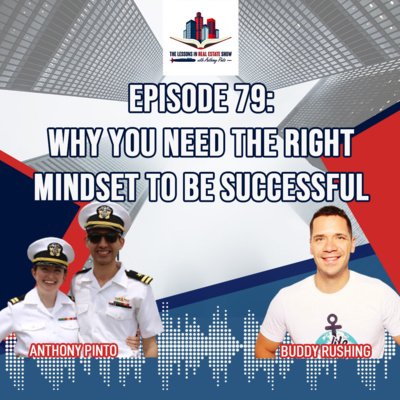
Episode 79: Why You Need the Right Mindset to Be Successful with Buddy Rushing
For today's episode, Let's welcome our guest Buddy Rushing, The owner and founder of White Feather Investments. Through his sweat and tears, He was able to transform White Feather Investments to what it is today. His company is dedicated to educating and empowering military members to achieve financial freedom through real estate investing.
Would you like to know more about real estate investing?
Check our website pintocapitalinvestments.com.
In this episode, we explore:
-Guest Background
-Capital Raising
-Real Estate Syndications
-Self education and having the right team
-White Feather Investments
-Types of Investments
-Scarcity Mindset vs Abundance Mindset
-Why overnight success is not ideal
-Upper Limit Problem
About Buddy:
Buddy Rushing is a former Marine Officer and a 2004 graduate of the United States Naval Academy where he earned a degree in Aerospace Engineering (if you can believe it). During his 16 years in the Marine Corps, he traveled around the world, leading Marines in training operations in Okinawa, Thailand, Philippines, South Korea, Guam and Bridgeport, as well as four deployments to Southeast Asia and Afghanistan.
His passion for Real Estate investing began by reading Rich Dad Poor Dad while leaning against a Humvee in Southeastern Afghanistan. That quickly spiraled into an impulsive decision to buy an overpriced, beat-up, piece of crap house in 29 Palms in June of 2007 then invest every penny he had in a FULL remodel that he did almost entirely with his own sweat and tears…only to find out two years later that his fully remodeled house was worth half what he paid for it two years earlier.
Out of that mistake came a ten year stretch of endless education, late hours, tons of offers, dozens of different types of deals, and finally the idea that sparked what White Feather Investments has become today. He brought his access to Turnkey investments together with his passion for Education and his savage loyalty to his brothers and sisters in uniform, and the result has been the explosive growth of a community unlike any others…where his vision of creating an entire generation of financially free military members is finally coming to life!
White Feather Investments is dedicated to educating and empowering military members to achieve financial freedom through Real Estate investing. In less than two years, he has grown their membership to over 450 active duty and former military members.
Snapshot: 39:22
1. What is your number one failure in real estate?
-Taking action without education
2. What advice do you have for other military investors to be successful?
-Get yourself education with free resources or minimal costs. Read a lot of books related to real estate and investing.
3. What inspired you to marry a military and serve your country?
-My dad was a marine.
4. What is your dream?
-To live the greatest version of my capabilities. To embrace financial freedom.
Quotes:
1. “If you keep that abundance mindset, and a long term mindset for real estate, there’s almost nothing you can’t overcome.” 30:11 - 30:20
2. “You may not be able to do something when you’re in the skift, or while you’re in a meeting or while you’re doing your job in the military. But, you can absolutely work during your lunch, you can absolutely work after hours.” 36:40 - 36:54
3. “Put in your weekends, 8 hours a day and 6 hour at night and you can build an empire in your spare time. But, it takes time.” 37:11 - 37:19
Snippet: 26:37 - 28:59
REELS: 29:59 - 30:20
Connecting with the Guest:
LinkedIn : www.whitefeatherinvestments.com

Episode 78: The Power of Starting Early with Julia Zhu
In today's episode we have the pleasure to have Julia Zhu. Julia, along with her boyfriend and partner, has established their own LLC called Middle Bridge Holdings LLC. They are now trying to do a multifamily syndication deal in Guam as well as looking for multi-family homes that are close to military bases.
Want to learn more about real estate investing? Visit our website, pintocapital.com.
In this episode, we explore:
- Guest Background
- Accomplishing the first property
- Concept of Financial Freedom
- Depreciation of properties
- Advantages of having OHA
- What makes Guam a huge tourist destination
- Multifamily market in Guam
About Julia:
She is a first-generation Chinese American immigrant who moved to the state from Guangzhou, China in 2012 when she was 14. She didn't even speak English when she first came to the state. However, in 2016 she received an appointment to attend the U.S. Naval Academy. In 2020, she graduated top of the class at the academy and continued her education at Johns Hopkins University (Master's in Finance) while working as an Active Duty Naval Officer (Nuclear Engineering option). At grad school, she was introduced to multi family home real estate investing. It quickly piqued her interest. Her boyfriend and her partner, Philip Middleton, is an amazing stock market investor and extremely bright and reliable. He is a fellow Nuclear SWO in the Navy stationed in Yokosuka, Japan. They dived into the world of real estate investing together. In a few months, they were able to establish their own LLC (Middle Bridge Holdings LLC), close on an apartment in Japan, purchase a piece of land in Alaska, and are currently closing on an apartment in Guam. They've also been aggressively building their network and educating themselves regarding real estate syndication.
She and Philip are now trying to do a multifamily syndication deal in Guam. As you may know, military rental in Guam is a very interesting niche market. They are looking for multi-family homes that are relatively close to military bases.
Snapshot: 37:37
1. What is your number one failure in real estate?
- None as the moment
2. What advice do you have for other military investors to be successful?
- Having a partner to keep each other accountable 24/7
3. What inspired you to marry a military and serve your country?
- Just the fact that I will be working with Americans made me so motivated.
4. What is your dream?
- To make the world a better place
Quotes:
- “I would rather say too much and speak too quickly than not speak and regret not saying anything later on.” 6:02 - 6:09
- “My dream is to make the world a better place. I know that it might sound big and empty but I initially joined the military because I want to make world peace.” 38:58 - 39:08
Snippet: 30:25 - 31:55
REELS: 37:06 -37:26
Connecting with the Guest:
LinkedIn : https://www.linkedin.com/in/xinhe-julia-zhu-8449251a5
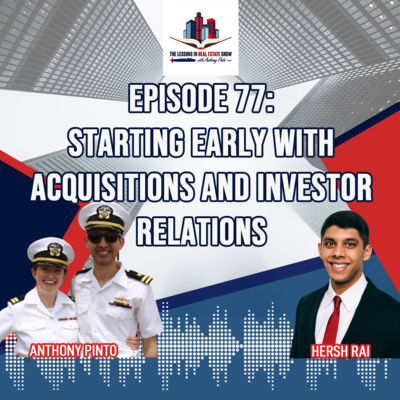
Episode 77: Starting Early with Acquisitions and Investor Relations with Hersh Rai
In this episode, we explore:
-Guest Military Background
-How he started real estate investing
-Make money work for you
-Networking with people
-Importance of Networking
-Deal Sourcing and Underwriting
-Finding the right partner
About Hersh:
Hersh Rai is a Managing Partner of RaiVu Capital where he focuses on acquisitions and investor relations. In addition, he focuses on creating streamline processes to create efficient operational flow through the use of technological solutions.
Further, Hersh is a co-host of the Multifamily Opportunities via Values, Education, and Socialization Meetup (MOVES) which is a virtual meetup held to teach about multifamily investing and presents unique guest speakers to speak on business and real estate investing topics to better educate attendees.
He hopes to use multifamily and mobile home park investing to inspire and serve others to achieve financial freedom and give back to his local community.
Beyond real estate investing, Hersh is an active duty Naval Officer who specializes in Cryptologic Warfare. Currently, he is serving on a Cyber Missions Team based out of Hawaii.
Hersh holds a dual B.S. in Computer Science and Information Technology from the United States Naval Academy. In addition, he holds a M.S. in Computer and Information Technology from Purdue University
Snapshot: 32:00
1. What is your number one failure in real estate?
-Under Contract on a 39 unit apartment building
2. What advice do you have for other military investors to be successful?
-Be able to balance your time and be dedicated to do something you really want to do.
3. What inspired you to marry a military and serve your country?
-I want to give back to the country that has given me so much.
4. What is your dream?
-To inspire other people that there are alternative ways of investing your money.
Quotes:
1. “I see every failure as a learning opportunity. It’s a mindset shift. If you see it as a way to learn from, it’s just giving you that much value for the next deal you may pursue. ” 32:25 - 32:36
2. “You need to balance all the time and really make sure that you’re understanding where you need to be at one place and when. 34:38 - 34:43
Snippet: 11:11 - 12:19
REELS: 15:43 - 16:06
Connecting with the Guest:
LinkedIn: https://www.linkedin.com/in/hershrai/
Facebook: https://www.facebook.com/hershrai

Episode 76: Fair Winds and Following Seas with Vadim Rey
In this episode, we explore:
- Guest Military Background
- How he started in real estate
- Lessons learned from the experiences
- Raising money for a deal
- Providing value to potential investors
About Vadim:
Vadim Rey was born in Ukraine, raised in Los Angeles, and educated in Boston. Having grown up blocks from Hollywood, CA, he was surrounded by wealth and yet lived in subsidized housing. Though his family and deaf parents did not have the comforts of money, they provided him with the grit, determination, and love that come from an immigrant family.
Vadim commissioned into the Information Warfare Community out of the Boston ROTC Consortium in 2015 and will be resigning his commission in 2022 to invest in apartments, to work with youth-focused non-profits, and to travel full time.
Vadim jumped into real estate after hearing enough senior Sailors talk about buying a house at every duty station. Using the VA loan, He bought a townhouse outside of his first duty station at Ft Meade, MD in 2018. Then he PCSd down to Norfolk, VA, joined ADPI’s first multifamily investing education cohort in 2019, invested in over 2,100 units as an LP, househacked a duplex using the VA loan again, secured his first GP position, and is now developing a real estate fund with Jonathan New, Corey Chonsky, and Andrew Ladner to make this world a better place.
Why multifamily investing? Because it is a synergy of exponential good to make this world a better place – our tenants get to live in quality, safe, affordable housing which allows them to dedicate more of their positive energy into their families and communities, and our investors get to earn quality returns with amazing tax benefits which allow them to spend less time working and more time with their families and communities.
Snapshot: 34:57
- What is your number one failure in real estate?
- Switching from used car sales mentality to a opportunity mentality
- What advice do you have for other military investors to be successful?
- Figure out your why and mindset. Don’t let anything stop you.
- What inspired you to marry a military and serve your country?
- My grandparents.
- What is your dream?
- To make this world a better place.
Quotes:
- “Focus on the deal first. If you can explain the deal, people will buy it. But if you have to sell yourself, then the deal probably doesn't make sense.” 18:36 - 18:46
- “You are selling the service of improving somebody else’s life and they have to be ready to improve their lives as well. And sometimes real estate is the option for them and sometimes it isn’t.” 26:57 - 27:10
Snippet: 16:46 - 18:47
REELS: 12:50 - 13:31
Connecting with the Guest:
LinkedIn : https://www.linkedin.com/company/fair-winds-capital-investments/%20
Website : https://www.fwcinvestments.com/

Episode 75: From Army National Guard to Real Estate Syndicator with Whitney Sewell
A Kentucky country boy by origin, Whitney Sewell, Army Natural Guard Veteran, was deployed in Iraq for all of 2005 when he was awarded Soldier of the Year. He has been happily married with Chelsea for 10 years and have adopted three children in that time.
In 2009, they transitioned to Real Estate Investing after Whitney's career in Law Enforcement. They established Life Bridge Capital LLC in 2017, a MultiFamily Syndication that helps others with financial opportunities. Since then, they've acquired 899 doors valued at about $126 million. Whitney is the daily podcast host of the Real Estate Syndication Show, a hub for experts and followers alike for valuable content.
Let's take an enriching financial journey with one of the most prominent names in Real Estate Investing and make it easier for our fellow military service members to get on board. Watch now and share with friends!
In this episode, we explore:
- Guest Military Background
- Transitioning into Real Estate
- Time management
- Starting Real Estate Syndication
- Building systems and processes
- How to start a podcast
- Ways to become a thought leader
- Factoring Success
- Finding the right partner
About Whitney:
Whitney Sewell is a country boy from rural Kentucky. He grew up riding horses and has always driven a Chevy truck. He is a veteran of the Army National Guard and spent all of 2005 deployed in Iraq. He was awarded the Soldier of the year that year. When he arrived home he began working for the Kentucky State Police and courting his lovely wife, to whom he’s been married for over 10 years. Whitney and his wife, Chelsea, have three children who came to their family by adoption.
They began investing in real estate in 2009 when it became clear that a career in law enforcement was not going to afford them the ability to live off one income as they desired. In 2017, they started Life Bridge Capital LLC, working with accredited investors and helping them improve their investment returns via the exceptional opportunities that multifamily syndication offers. Whitney has always had a passion for both real estate and helping others, and Life Bridge Capital LLC affords him the opportunity to do both, while also funding a very important cause that has become deeply personal. This becomes the best of both worlds for investors.
Through working with Whitney, investors not only receive exceptional returns financially but also change both the lives of orphans around the world and the lives of the families who adopt them. Whitney is quick to point out that while this is his own passion, he doesn’t make this the main focus to investors, but does hope a certain percentage feel good about what Life Bridge Capital does.
We have 899 doors under management valued at approximately $126 million.
Whitney is also the host of The Real Estate Syndication Show, a daily podcast where he interviews experts in the real estate syndication business and provides essential content for his listeners. Life Bridge Capital's motto is: making a difference one investor, one child, at a time.
Connecting with the Guest:
Website : www.lifebridgecapital.com
Email : whitney@lifebridgecapital.com
Phone Number : 540-585-4338
Facebook:
Instagram:
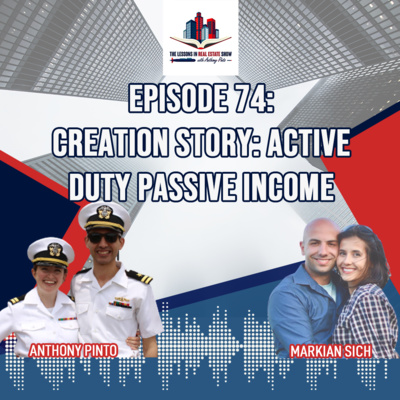
Episode 74: Creation Story: Active Duty Passive Income with Markian Sich
In this week's episode we are honored to have Markian Sich as our special guest. He is an Active Duty Marine Corps Communication Strategist, and Operations Officer stationed in New Orleans, Louisiana. As a third generation Ukrainian Immigrant, Markian learned about what citizens could achieve because of the bar that his parents and grandparents had set. Aside from his outstanding military service, Markian followed his dream of investing in Real Estate for financial freedom after his graduation from the United States Naval Academy. His ambition grew with the trials of teaching other military officers about Real Estate Investing as a course and alongside his community of Active Duty Passive Income.
Let's get into the seat of opportunity with Markian as he gives us insight on how to Invest in Real Estate while on active duty.
In this episode, we explore:
- Guest Military Background
- Finding Passive Income
- Mindset of the Country
- The law of positive attraction
- How to be successful in life?
- Lesson learned from his experiences
About Markian:
CEO and Founder of Active Duty Passive Income, Markian Sich is an Active Duty Marine Corps Communication Strategy and Operations Officer stationed in New Orleans, Louisiana. Markian is a third generation Ukrainian immigrant who learned about the opportunities that our great country provides its citizens from the good example set by his parents and grandparents. In addition to serving in the military, Markian started to pursue real estate investing as a method of securing his financial future soon after graduating from the United States Naval Academy. His success (and failures!) inspired him to teach other members of the military about real estate investing. This is when the course and community, Active Duty Passive Income was born.
Snapshot: 40:59
- What is your number one failure in real estate?
- Not getting good enough at underwriting since the beginning.
- What advice do you have for other military investors to be successful?
- Utilize your VA loan.
- What inspired you to marry a military and serve your country?
- I want to challenge myself.
- What is your dream?
- Build ADPI with my team & Helping military creating streams of income
Quotes:
- “You get motivation because of past successes.” 12:11 - 12:14
- “Think about it, focus on what you want, meditate on it, write about it, journal about it, it will manifest itself.” 17:13 - 17:23
Snippet: 19:47 - 21:08
REELS: 29:15 - 29:39
Connecting with the Guest:
Website : activedutypassiveincome.com
Email:
Facebook:
Instagram:

Episode 73: Yes We Can!: Erin Helle
In this episode, we explore:
- Guest Military Background
- Struggles of starting or having a family
- Finding the time balance for work and family
- Real Estate background of the guest
- Having the right resources and cash reserves
- Acquiring different financial resources
About Erin:
Erin served in the US Army for 14 years and loved every minute of it. She excelled as an Engineer officer, shattering glass ceilings and paving the way for women who came after her. When she was put on orders to deploy the same month as her husband shortly after having their first daughter, she knew the Army was no longer going to work for her. She resigned overnight, leaving the Army without a plan. Erin wanted to be successful, and show her daughters the value of hard work and creating something to be proud of, but did not want to be tied to a 9-5 job and be told where to be and when to be there. So, she embarked on a quest to figure out exactly what that looked like. Navigating the terrifying yet incredibly fulfilling journey to buying her first rental property led to the realization that she loved chasing the deal, negotiating, and building a solid future for her family. She, along with her husband, purchased 19 doors in the first year and a half, and her business earned six figures during the first full year of operation. Erin’s portfolio now includes 38 doors and is valued at almost $3 Million. But, she’s just getting started!
Erin loves to help people achieve financial freedom through Real Estate Investing and is passionate about coaching, training and mentoring people to be successful. Her business was created to build a future for her family and leave a legacy, but it quickly morphed into a passion to teach others to do the same.
Snapshot: 38:07
- What is your number one failure in real estate?
- Lacking confidence in myself
2. What advice do you have for other military investors to be successful?
- Just do it.
3. What inspired you to marry a military and serve your country?
- The idea of financial freedom. Just doing something that I felt mattered.
4. What is your dream?
- Completely financially free.
Quotes:
- “That’s what I tried to do everyday. I tried to sort of be retired every day and just be passionate about what I am doing and what I get to do.” 17:28 - 17:36
- “It’s really not about the investment that you make. It’s about whether or not you make that investment. What separates people from being successful from those who never get involved is taking action.” 22:31- 22:44
Snippet: 33:54 -
REELS: 22:48 - 23:15
Connecting with the Guest:
Website : bcglobalinvestments.com
Email: Erin@bcglobalinvestments.com
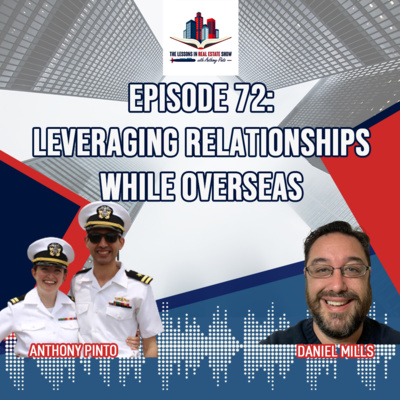
Episode 72: Leveraging Relationships while Overseas: Daniel Mills
In this episode, we explore:
- Guest Background
- Financial Mindset
- Real Estate Investment Strategy
- Conventional Financing on a Single Family house
- Biggest challenges in investing overseas
- Understanding the time difference when investing overseas
- Why it’s not good to invest real estate in Japan
About Daniel:
Daniel J. Mills is a university professor in Japan where he has lived for 14 years. He began investing in real estate in 2014. His portfolio, which is located in Idaho, Alabama, and Tennessee, includes 11 single-family homes, 14 duplexes, and a 12-plex. Daniel utilized a number of strategies including conventional and commercial loans, owner financing, BRRRR, partnerships, and private money to acquire these properties. After achieving financial freedom in 2020, Daniel has shifted to passive investment strategies to grow and diversify his real estate portfolio. He is currently invested as a limited partner in two multi-family syndications and is seeking additional private placements in self-storage, industrial, mobile home parks, and senior living.
Daniel joined the Marine Corps after graduating from high school in 1996. Unfortunately, his service was cut short by a training accident. Daniel received an honorable medical discharge from the Marine Corps in 1997.
Snapshot: 42:14
- What is your number one failure in real estate?
- I chased the 1% rule too much.
- What advice do you have for other military investors to be successful?
- Plug in to a lot of these investor groups.
- What inspired you to marry a military and serve your country?
- Joining the marine corp was going to give me the discipline and the skills I needed to succeed later in life.
- What is your dream?
- Financial Freedom
Quotes:
- “Understanding what your limitations are and then developing the relationships to fix it rather than trying to take on everything yourself.” 27:43 - 27:49
- “So far, when I look at Japanese real estate like apples to apples, I always see a better return in the US.” 30:55 - 31:03
Snippet: 22:26 - 23:45
REELS: 26:51 - 27:16
Connecting with the Guest:
Facebook: https://web.facebook.com/netmonkjapan
LinkedIn: https://www.linkedin.com/in/daniel-j-mills-ed-d-037b351a/

Episode 71: Real Estate Rookies Part 6: Travis Hill
In this episode, we explore:
- Guest Background
- Teaching Real Estate to the Kids
- Losing 1.2 Million in real estate property
- Getting back to investing after a traumatic experience
- Having the right Mindset
- 5Plex in Cleveland
- Getting involved in an investment company
- Assisted Living Home
About Travis:
Travis Hill is an active-duty Marine, cancer survivor, and out-of-state investor. 12 years ago, he lost 1.2 million in real estate property. After deploying four times, twice to Iraq and twice to Afghanistan he started investing in real estate again. In January 2019, he was diagnosed with stage 3 colon cancer. Currently, Travis is an out of state investor with Single Family Homes in Milwaukee, land in Arizona, a recently purchased 5-plex in Cleveland, and currently negotiating an assisted living home in Springfield. Between losing a million, deployments, and cancer he has learned a thing or two about mindset, resiliency, and focus. He aims to help others, through his experiences, with mindset, discipline, and self-worth.
Snapshot: 42:56
- What is your number one failure in real estate?
- Only focusing on one thing
- What advice do you have for other military investors to be successful?
- Be willing to learn and grow, set your ego aside and be humble.
- What inspired you to marry a military and serve your country?
- 9/11
- What is your dream?
- Having the freedom to own your time, be with your family and enjoy memories and experiences as a family.
Quotes:
- “There is so much available for anybody that has the discipline to want to move forward.” 17:43 - 17:49
- “You can bless and improve the lives of other people by connecting them and watching those two people shake hands and do your introduction email right and then go forth and see their success.” 25:46 26:00
Snippet: 16:52 - 18:12
REELS: 25:25 - 25:52
Connecting with the Guest:
LinkedIn: https://www.linkedin.com/in/travis-hill-/
Facebook: https://web.facebook.com/travis.hill.908
Instagram: @Travishill1310
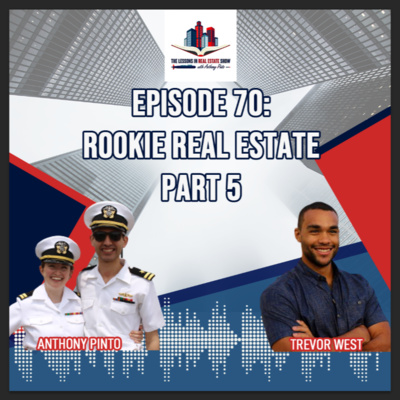
Episode 70: Real Estate Rookie Part 5: Trevor West
In this episode, we explore:
- Guest Background
- Starting Financial Literacy
- Surrounding yourself with the right people
- Money Blueprint
- Learning through your failures
- Having a positive mindset
- Lessons learned
About Trevor:
Trevor B West is an 8-year military veteran who specialized in Intelligence Analysis with Special Forces during his time in the Air Force. After a significant mindset shift, Trevor started his search for a more meaningful and powerful life. The first step was financial literacy as this would be the key to freedom which quickly turned into Real Estate Investing and being a real estate agent. Over the past 14 months, Trevor has scaled from 0-14 multi-family units and is working toward acquiring his first apartment complex. Trevor leads with a positive attitude, high energy and motivation towards maximizing his life and encouraging others do the same through real estate investing.
Snapshot: 38:20
- What is your number one failure in real estate?
- Not going fast enough.
- What advice do you have for other military investors to be successful?
- Work on yourself. Better to be alone then get surrounded by wrong people
- What inspired you to marry a military and serve your country?
- I want to make a difference.
- What is your dream?
- Travelling, learning and educating others on how to maximise their lives. I want to be a consultant and have the power to choose.
Quotes:
- “Real Estate is something that I can do myself, I don’t need anybody else and I don’t need to go to school, all I need to do is learn different strategies. And this is something I can create for myself and my future family.” Trevor West 7:48 - 8:03
- “There are three ways that we can use our time. We can either spend it, share it or we can invest it just like money.” 10:29 - 10:35
- “If you just take a moment of silence, you might uncover something truly spectacular about yourself because we all have it within us to reach levels of success that we never thought possible for ourselves.” 19:03 - 19:14
Snippet: 23:44 - 24:56
REELS: 04:29 - 05:09
Connecting with the Guest:
Website: hyveci.com
Instagram: https://www.instagram.com/bettertrevor/
LinkedIn: https://www.linkedin.com/in/trevor-west1/
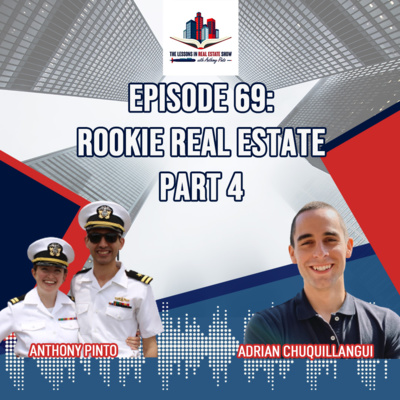
Episode 69: Real Estate Rookie Part 4: Adrian Chuquillangui
Adrian Chuquillangui, an aspiring multifamily syndicator and active-duty U.S. Coast Guard Officer, joins us on this week's show. The Chuquillangui family has been blessed with opportunities to participate in parish support missions such as youth ministry and campus ministry, which has enabled them to share their love for Christ with high school and college students and to be a resource for those in need.
Don't miss this episode as Adrian discusses what motivated him to seek financial independence and why he decided to invest in multifamily real estate.
In this episode, we explore:
- Guest Background
- Leveraging Time and Financial freedom
- Challenges in Real Estate
- Real Estate Resources
- Military breakthroughs
- Finding Deals
- Raising Capital
- Qualities of a Business Partner
About Adrian:
Adrian is an aspiring multifamily syndicator and active duty U.S. Coast Guard (USCG) Officer. He received a bachelor’s degree in Operations Research and Computer Analysis from the U.S. Coast Guard Academy where he played basketball for four years. After commissioning in 2017,
he served as a Deck Watch Officer on USCG Cutter THETIS where his team conducted law enforcement patrols in support of the counter drug and migrant interdiction missions, and then served as an assistant operational planner and boat manager on the District Fourteen enforcement team to accomplish national security objectives combating Illegal, Unregulated, and Unreported (IUU) fishing. He is currently a student naval aviator at basic flight training in Pensacola, FL. He and his wife have been married since 2018, had their first son in 2020, and are hoping to continue building their family. Throughout their journey in the USCG, the Chuquillangui family has been blessed with opportunities to serve in and support parish missions including youth ministry and campus ministry allowing them to share their love for Christ with high school and college students and to be a resource for those diving into their faith. This has fueled Adrian’s desire to pursue financial freedom through the vehicle of multifamily real estate investing in order to spend his time raising his family, being present with his wife and kids, giving back, and serving the mission of the New Evangelization. Adrian joined the Active Duty Passive Income (ADPI) Military Multifamily Mastermind and Academy in 2020. He is focused on raising capital and currently on a mission to become a General Partner on a team and close his first commercial multifamily deal.
Snapshot: 27:49
- What is your number one failure in real estate?
- Not getting the education before taking action.
- What advice do you have for other military investors to be successful?
- Strive for excellence and pace yourself.
- What inspired you to marry a military and serve your country?
- Recruiters when I was in highschool
- What is your dream?
- Live with my wife and children as good leaders and servants to God.
Quotes:
- “Just being able to have the flexibility and adaptability that the military instils in us, I think we get to go a long way.” 15:59 - 16:07
Snippet: 10:04 - 11:23
REELS: 25:54 - 26:35
Connecting with the Guest:
LinkedIn: https://www.linkedin.com/in/adrian-chuquillangui-096b5a1ba/
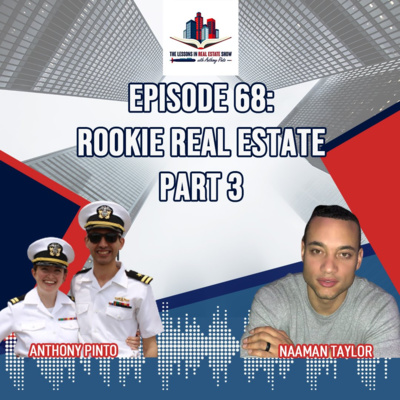
Episode 68: Real Estate Rookie Part 3: Naaman Taylor
In this episode, we explore:
- Guest Background
- Should we buy a house or rent a house?
- Finding out how to use VA Loan
- Buying and Holding stocks
- Challenges of Investing from overseas
- Finding deals through wholesalers
- Different types of resources
- Financing deals
About Naaman:
Naaman Taylor is an Active Duty Army soldier of 12 years and plans to make a career out of the Army. He has been a Real Estate Investor for seven years starting with his VA loan. His current portfolio consists of a Four-plex in Killeen Texas, Triplex in Lawton Oklahoma, two duplexes in Harker Heights Texas and four single family homes in the Dallas Fort Worth area (15 units across small MF and SFHs). He loves to invest in the 2-4 family homes surrounding military bases for high cash flow and central to northern Texas cities for appreciation and median cash flow. His future plans are to buy and hold as many properties as God allows him for retirement.
Snapshot: 36:24
- What is your number one failure in real estate?
- A place of mine went over budget.
- What advice do you have for other military investors to be successful?
- Utilize your VA loan correctly.
- What inspired you to marry a military and serve your country?
- I enjoy the work as a soldier and teaching younger ones.
- What is your dream?
- I just want to travel all the time.
Quotes:
- “People do this all the time, people live everywhere around the world and make money around the world.” 17:49 - 17:52
- “If you find to yourself that you are deserving to make money and you deserve to have nice things, you can find a way. You have to believe in yourself first.” 17:56 - 18:03
Snippet: 12:24 - 13:28
REELS: 26:13 - 26:52
Connecting with the Guest:
Instagram: https://www.instagram.com/uncommon_denominator1/?hl=en
Facebook: https://web.facebook.com/taylor.naaman

Episode 67: Real Estate Rookie Part 2: Adam Whitney
In this episode, we explore:
- Guest Background
- Books and Resources to get started in Real Estate Investing
- What is paper money?
- Doing Due Diligence
- Why is Networking important?
- Challenges of doing Due Diligence
About Adam:
Adam is husband, father, active duty Marine and real estate investor. Founder of Will to Win Investments which focuses on residential real estate. He owns a few single-family rentals in Northern Virginia and Milwaukee, Wisconsin. He also provides private lending for other investors.
Adam is also invested in a Mobile Home Park syndication. He’s purchased a primary residence through a VA loan and bought rentals in cities he’s never been to. He’s experienced quality misses that have taught him valuable lessons in due diligence. He missed on three separate duplexes in Northwest Arkansas due to serious plumbing issues.
He also missed on a 42 unit, $2.1MM, apartment complex in a JV after discovering issues during due diligence. He’s currently building a direct to seller business in Tampa, Florida. There are three critical skills in real estate regardless of niche; Networking, finding deals and raising money.
Snapshot: 36:35
- What is your number one failure in real estate?
- Not taking action sooner.
- What advice do you have for other military investors to be successful?
- Reach out to other investors and aggressive networking
- What inspired you to marry a military and serve your country?
- The ability to serve the patriotic nature of the country during 9/11
- What is your dream?
- Create a life that we love living. Making enough money to give it away and serve other people.
Quotes:
- “You don’t have to be a construction expert to be able to talk to other humans and understand if they are trustworthy kinds of people.” 17:25 - 17:33
- “There is no perfect and there’s a lot of different ways to do stuff. The search for perfect will lead you to the road that will never end.” 17:50 - 18:00
- “Even when you get clarity and you start taking action, sometimes 6 months from now you’ll evolve. You personally evolve, your experience evolves, your knowledge evolves.” 22:06 - 22:18
Snippet: 11:41 - 13:13
REELS: 20:15 - 20:43
Ad - 22:45
Connecting with the Guest:
Website: https://willtowininvestments.com/
Instagram: https://www.instagram.com/will_to_win_investments/
Linkedin: https://www.linkedin.com/in/adamwhitney1/
Check out Mission First Capital, the first real estate investment fund made specifically for active duty and veteran military investors.

L - Procrastination is Wisdom, T - One Year Down!
In this week's LNT episode, Anthony talks about a book he read called "Who Not How". He shares some valuable life lessons he learned from the book, such as how to avoid obsessing about the "how" and instead take action, whether it's building a company, passively investing in something, or starting a podcast.
Let's continue our great financial journey and learn more by clicking the link below! Please click the link for more of our content https://linktr.ee/pinto.capital

MFC Presents - What is Your Dream
A dream, mission, or purpose are all things that most of us know we need when working for success but have forgotten why it is so important that we follow them through.
Tune in and don't miss this episode with Anthony as he discusses why it's important to keep pursuing your dreams and working towards your goals amidst all the challenges life throws at you.
Please click the link for more of our content
https://linktr.ee/pinto.capital
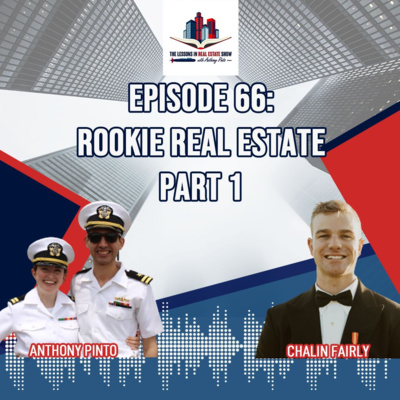
Episode 66: Rookie Real Estate Part 1: Chalin Fairly
In this week's episode, we are joined by an aspiring syndicator, Chalin Fairly. Chalin graduated from the United States Naval Academy in 2019 and then reported to Pensacola, FL with an aviation contract where he is presently conducting flight training as a Student Naval Flight Officer. Chalin jumped headfirst into real estate by leveraging his VA loan to purchase a single-family home that he has been house hacking by renting to other flight school students and he has since transitioned to focusing his efforts on commercial multifamily after lessons learned in the residential space. You don't want to miss this episode with Chalin as he shares his journey in becoming financially independent and tackling his first deal in 2021!
In this episode, we explore:
Guest Background
House Hacking Challenges
House Hacking leads for multifamily syndications
Multifamily Challenges
Getting over the mindset of having an imposter syndrome
Strategies for generating capital
About Chalin:
Chalin graduated from the United States Naval Academy in 2019 with a degree in quantitative economics and a commission into the US Navy. He then reported to Pensacola, FL with an aviation contract where he is presently conducting flight training as a Student Naval Flight Officer. He was recently selected into the P-8 community and will be winging the end of March 2021.
While in Pensacola, Chalin jumped headfirst into real estate by leveraging his VA loan to purchase a single-family home that he has been house hacking by renting to other flight school students. He and his wife also purchased a home in Jacksonville, FL using her VA loan that will eventually become a long-term buy and hold rental. Chalin has since transitioned to focusing his efforts on commercial multifamily after lessons learned in the residential space and is an aspiring syndicator. He looks forward to tackling his first deal in 2021!
Snapshot:
What is your number one failure in real estate?
Managing the property of my first deal.
What advice do you have for other military investors to be successful?
Educate yourself and be willing to take action.
What inspired you to marry a military and serve your country?
Being a part of the team and working together for a common goal.
What is your dream?
Achieve financial freedom and spend more time with family.
Quotes:
“ If you never take action, then you’re going to forever remain a theoretical investor.”
“I don’t want to call myself a multifamily investor when I haven’t closed any deals. But if I don’t believe in myself that I am a multifamily investor, then I would never close any deals. So, believe in yourself and continue on that journey.”
Connecting with the Guest:
LinkedIn : https://www.linkedin.com/in/chalin-fairly-commercial-multifamily/
Email : chalin@fairlycapitalinvestments.com
Phone Number : 804-205-8076

L- Key Man Insurance, T- Build Your Team Now
In this week's LNT episode, Anthony talks about what a Key Man Insurance is and the importance of having one in a company. It is a life insurance policy that a company buys in the life of an owner, CEO, or COO, or any person deemed critical to the business. He also talks about how to get started in multi-family investing or real estate as a whole and why you need to start building your team now.
Let's continue our great financial journey and learn more by clicking the link below! Please click the link for more of our content https://linktr.ee/pinto.capital

MFC Presents - What Is A KP?
Anthony Pinto discusses what a Key Principal is also known as KP. He talks about why they are needed, the advantages and disadvantages of becoming a KP, and how you can become one.
Please click the link for more of our content
https://linktr.ee/pinto.capital
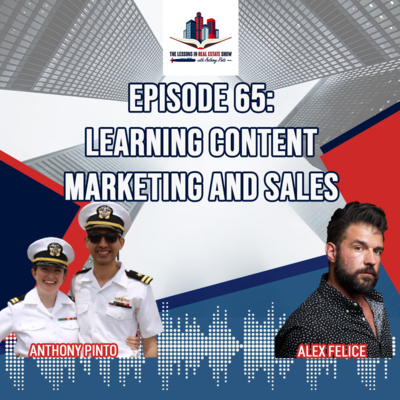
Episode 65: Learning Content Marketing and Sales with Alex Felice
In this week's episode, we are joined by Alex Felice an avid content creator running brokeisachoice.com and the co-host of the From Military to Millionaire podcast. Alex used to be a risk analyst for SBA loans and has been in the real estate business since 2014. He began his real estate career as an investor buying single-family homes using the BRRR method and delayed finance and he most recently started buying apartments. In 2019, he bought a 24 unit complex through a joint venture, and in 2020 he closed a 52 unit through syndication. If you want to learn how to invest in real estate tune in and don't miss this episode with Alex as he shares with us his best practices and how you can achieve financial freedom.
Tune in to know his secrets to success and check out Mission First Capital, the first real estate investment fund made specifically for active duty and veteran military investors.
In this episode, we explore:
- Guest Background
- Learning how to do sales
- How to be successful in sales
- Content Marketing
- Finding the right people for you
- Evolving to Multifamily
- Finding the partners to work with
About Alex:
Alex has been a real estate investor since 2014. Beginning with buying single-family homes using the BRRR method and delayed finance and most recently started buying apartments. In 2019 Alex bought a 24 unit complex through a joint venture and in 2020 he closed a 52 unit through syndication.
Alex has a bachelor's degree in Finance and was previously a risk analyst for SBA loans. He is an avid content creator running brokeisachoice.com, producing blogs and videos for Biggerpockets, and is the co-host of the From Military to Millionaire podcast.
Snapshot:
What is your number one failure in real estate?
Going too slow and thinking too small and too scared
What advice do you have for other military investors to be successful?
Don’t hang out with military people. Hang around to people you want to become.
What inspired you to marry a military and serve your country?
Peer group
What is your dream?
I want to go to space.
Quotes:
“The army did teach me a lot of things about life, a lot of soft skills. But the number thing the military taught me was self-responsibility and that’s the number one lesson to life in my opinion.”
“You don’t have to be good at content marketing. What you need to have is an authentic message.”
Connecting with the Guest:
Website: https://www.brokeisachoice.com/
Facebook: https://www.facebook.com/AlexanderFelice
YouTube: https://www.youtube.com/channel/UCKFfj91XXrqmKH0y523X79Q
Twitter: https://twitter.com/brokeisachoice
Instagram: https://www.instagram.com/alexscottfelice/

L- Building the Life You Want Now, T- Finding 10 Out of 10 people
When you learn how to prioritize your life, you'll be able to concentrate with intention on what is important and achieve your most important goals.
Anthony Pinto talks about taking immediate action on the things you want to incorporate in your life whether it's starting up a business, or spending quality time with family, or traveling, now is the right time to start.
Let's continue our great financial journey and learn more by clicking the link below! Please click the link for more of our content https://linktr.ee/pinto.capital

MFC Presents - Classes of Multifamily Properties
Multifamily real estate investing is considered one of the best assets to invest in. Anthony Pinto shares with us the different classes of multi-family real estate which are broken down into 4 distinct categories, class A, B, C, and D apartments, and why a real estate investor needs to understand each real estate asset class and determine which property type best fits your investment goals.
Please click the link for more of our content
https://linktr.ee/pinto.capital
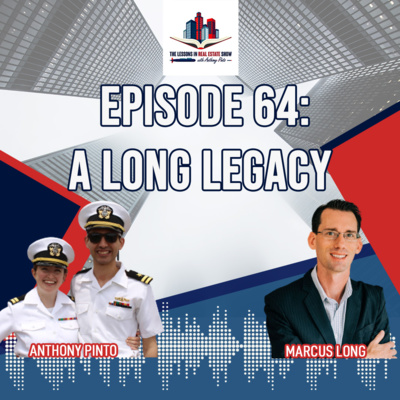
Episode 64: A Long Legacy with Marcus Long
This week's talk, Marcus will share some of his takeaways in the military and how he capitalizes on his experiences to succeed in the real estate business. Enlisted in a military at a young age, Marcus did not hesitate to invest his earnings in the real estate business. After a few years in active duty, he purchased his first property back in 2014. Now, he has amassed a huge fortune from his real estate investments. Like he said, success comes with discipline.
Tune in to know his secrets to success and check out Mission First Capital, the first real estate investment fund made specifically for active duty and veteran military investors.
In this episode, we explore:
- Guest Background
- Different asset classes
- Advantage and Disadvantages of Active Duty Investor
- Challenge of Time Difference
- Building processes and Finding the right people
- War Room Mastermind
About Marcus:
Marcus is a husband, father of a 6 and 3 year old and an active duty Naval Officer currently stationed in England with over 19 years of service. He currently owns or has general partnership in 14 properties to include single family, multi-use, and farms; is a limited partner in 190 units in apartment and mobile home park syndications; and has experience in private lending.
Marcus is a member of the War Room Mastermind and 7 Figure Flipping. He is currently expanding his single-family acquisitions in Kansas City and plans to join his first multi-family general partnership this year.
He recently launched A Long Legacy in which he seeks to share his experiences and provide resources for others to achieve financial freedom, make an impact, and leave a legacy.
Snapshot:
- What is your number one failure in real estate?
- Waiting so long to surround myself with the people in the mastermind group.
- What advice do you have for other military investors to be successful?
- Appreciate the knowledge of what those numbers are. Put yourself in the position that you can make a choice.
- What inspired you to marry a military and serve your country?
- Figuring out what I want to do with my life. The people
- What is your dream?
- To do what I want with my family, when I want and whenever I want.
Quotes:
- “Investing in those types of things and processes in finding the right people will help us gain that freedom that we are all seeking.”
- “I just want to accept the conditions that we always have a choice. We get to choose how we spend our time and what makes us happy.”
Connecting with the Guest:
Website : https://alonglegacy.com/
LinkedIn : https://www.linkedin.com/in/marcus-long-22278391/?originalSubdomain=uk
Instagram : https://www.instagram.com/alonglegacyrei/
Facebook : https://www.facebook.com/marcus.long/

L- Seeing Waste, T- Three ways to find CRE deals
On the path of growth, there are times when we relentlessly push and feel inspired to achieve our goals. Then there are days when we stagnate. We feel uninspired and unmotivated to do anything. We keep procrastinating on our plans.
Anthony Pinto talks about the idea of constantly improving through the "2 Second Lean Process" and how it can make an impact in your life and your business by making small improvements on a daily basis at a prescribed time.
Do you find yourself procrastinating often and keep pausing on your plans? Comment down below on what tips you find helpful to combat procrastination.
Let's continue our great financial journey and learn more by clicking the link below! Please click the link for more of our content https://linktr.ee/pinto.capital

MFC Presents - My Experience With The Eviction Moratorium
The federal government is taking steps to minimize the impact of the pandemic crisis on tenants by implementing moratoriums on evictions. Because of this, landlords across the US are facing a nightmare. Anthony Pinto gives us an insight on how to handle an eviction moratorium and how to deal with your tenants.
Do you have friends or family who are property owners or landlords? For more insightful and relevant topics as such, be sure to check out our Learn and Teach segment here https://linktr.ee/pinto.capital

Episode 63: Become Financially Free and Independent with Doug Nordman
In this week's episode, we are joined by the author and founder of The Military Guide, Doug Nordman. Doug served 20 years in the U.S. Navy and retired at age 41. In 1999, he and his spouse Carol reached financial independence and has bought and sold homes over the last 37 years. They have also published several books providing a roadmap for service members, veterans, and their families on how they can become financially independent.
Tune in and don't miss this episode with Doug as he shares with us how you can reap financial rewards and how to avoid the risks of real estate investing while on active duty.
In this episode, we explore:
- Guest Military Background
- Home Improvement and Real Estate
- Paths you can use when buying a home
- Evaluating a property’s operating expenses
- The 1% thumb rule
- What it means to become financially free
About Doug:
Doug Nordman served for 20 years of active duty in the U.S. Navy’s submarine force and retired in 2002 at the age of 41. He and his spouse, a retired Navy Reservist, reached financial independence in 1999 on a high savings rate. They’ve lived in Hawaii for over 30 years, and their daughter Carol was born & raised on Oahu. These days Doug enjoys surfing, slow travel, writing, public speaking, reading, home improvement, personal-finance conferences, and more surfing.
He’s the author of “The Military Guide To Financial Independence And Retirement” and founder of The-Military-Guide.com. He donates all of his writing and speaking revenue to military-friendly charities, and he can be reached at NordsNords@Gmail.com and @TheMilitaryGuide.
Carol and Doug are the authors of “Raising Your Money-Savvy Family For Next Generation Financial Independence”, published with ChooseFI Media.
Doug and his spouse have bought & sold several homes over the last 37 years, and they’re currently managing a single-family rental. They’re keenly aware of the financial rewards and risks of real-estate investing while on active duty.
Snapshot:
1. What is your number one failure in real estate?
- Bought home in every duty station and rented out.
2. What advice do you have for other military investors to be successful?
- Follow your interest.
3. What inspired you to marry a military and serve your country?
- My friend’s older brother.
4. What is your dream?
- Keep living the life that I’m living right now
Quotes:
- “If you want to invest in real estate then invest in real estate. Don’t become an accidental landlord.”
- “If you’ve reached financial independence on your own, maybe you don’t need that pension anymore or maybe you can buy healthcare.”
Connecting with the Guest:
Twitter: https://twitter.com/themilitaryguid?lang=en
LinkedIn: https://www.linkedin.com/in/dougnordman/
Facebook: https://www.facebook.com/doug.nordman.5
Instagram: https://www.instagram.com/themilitaryguid/

L Extreme Ownership, T What is a Proof of Funds
Have you read the book about Extreme Ownership? We get into detail about what the proper takeaway is and how we can apply the concepts to our daily workflow.
In this episode, we also teach Proof of Funds and how to acquire this document as well as use it.
Let's continue our great financial journey and learn more by clicking the link below! Please click the link for more of our content https://linktr.ee/pinto.capital
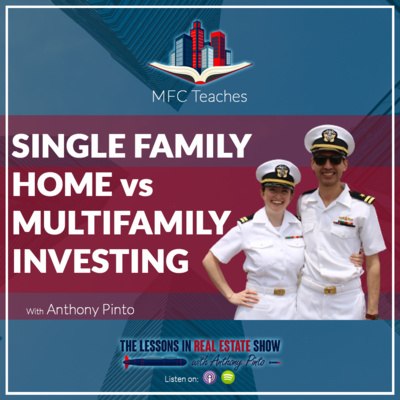
MFC Presents- Single Family Home vs Multifamily Investing
How deep is your understanding in terms of how Real Estate Investing works? Let's explore all the differences between Single Family Homes vs MultiFamily Properties with Anthony Pinto from Pinto Capital Investments. Don't forget to subscribe, like, comment, and share this informative video with your friends!
Please click the link for more of our content
https://linktr.ee/pinto.capital
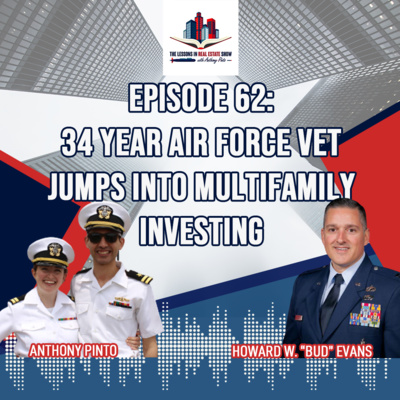
Episode 62: 34 Year Air Force Vet Jumps Into Multifamily Investing with Howard W. "Bud" Evans
In this week’s episode, we are joined by a real estate investor and full-time Senior Intelligence Officer, Major Howard W. “Bud” Evans. 34 years in the Air Force, Bud shares with us why he decided to venture into real estate investing and how it can be a viable way to build additional income while still in active duty and well into retirement.
You don't want to miss this episode with Bud. Tune in as he shows you how taking risks gives you a competitive advantage and how investing in real estate can give you access to a passive cash flow which will help you gain financial freedom and spend more time with your family.
In this episode, we explore:
- Guest Background
- Self Limiting beliefs
- Getting the first transactions
- How real millionaires look like
- Transitioning to multifamily real estate
About Howard:
Major Howard W. “Bud” Evans is the Senior Intelligence Officer (SIO), 111th Attack Wing, 111th Operations Group, Horsham Air Guard Station, Horsham, Pennsylvania. As SIO, he is responsible for directing over 60 Intelligence
personnel in several areas to include Stan/Eval, Training, Plans, Operations, Scheduling, Intelligence Surveillance and Reconnaissance and inspections criteria to the 111th Operations Group and the 111th Attack Wing. The primary
mission is the training of personnel and preparing subject matter experts to ensure they are available resources for contingency analysis, analyzing flight evaluation data for trends that indicate changes in operations or additional
training needs for individuals, as well as planning and execution at the operational and tactical levels.
Major Evans began his Air Force career in Aug 1987 by enlisting in the active duty Air Force. He worked as a Munitions Systems Technician,graduating from technical school in Oct 1987 specializing in air-to-air missiles on F-15 fighter aircraft. He left active duty to work on the A-10 and enlisted in the 111th Fighter Wing in August 1989 and worked armament for the A-10 aircraft as a traditional guardsman. He served as a municipal police officer in Radnor Township from 1993 until 2005. He returned to duty as an Active Duty Guardsman (AGR) in 2005 and worked as a Contracting Specialist in the procurement field of finance. He was selected as an Officer Candidate and Commissioned a 2nd Lieutenant in the Pennsylvania Air National Guard in November 2008 where he currently serves as an AGR.
Snapshot:
- What is your number one failure in real estate?
- What advice do you have for other military investors to be successful?
- What inspired you to marry a military and serve your country?
- What is your dream?
Quotes:
- “Going to the head of the mass to the tail of the donkey is very difficult.”
- “When you go out there it’s a game of mistakes. And the better mistakes that you make, the better the end result will be.”
Connecting with the Guest:

L Evening Routines, T Be a Viable Buyer
When you get up in the morning, the first things that you need to do are some of the most impactful factors to making your day as good as it can be. So what can we do in the evening to ensure that? Let's learn about getting the right routines on track and how we can be a viable buyer in this important episode of L&T.
Let's continue our great financial journey and learn more by clicking the link below! Please click the link for more of our content [https://linktr.ee/pinto.capital]